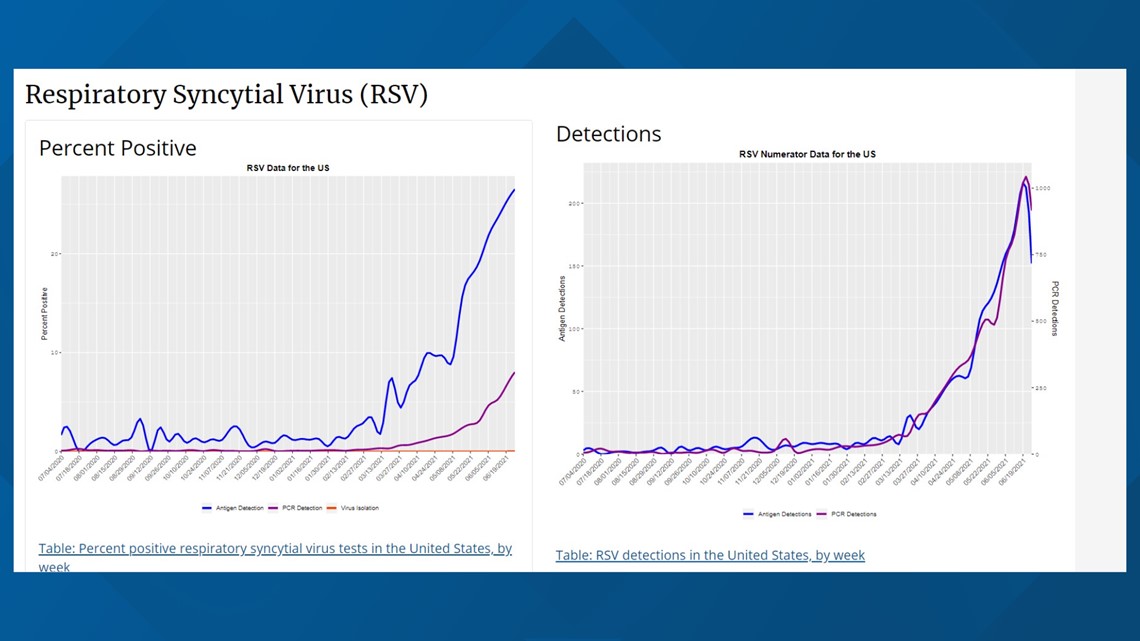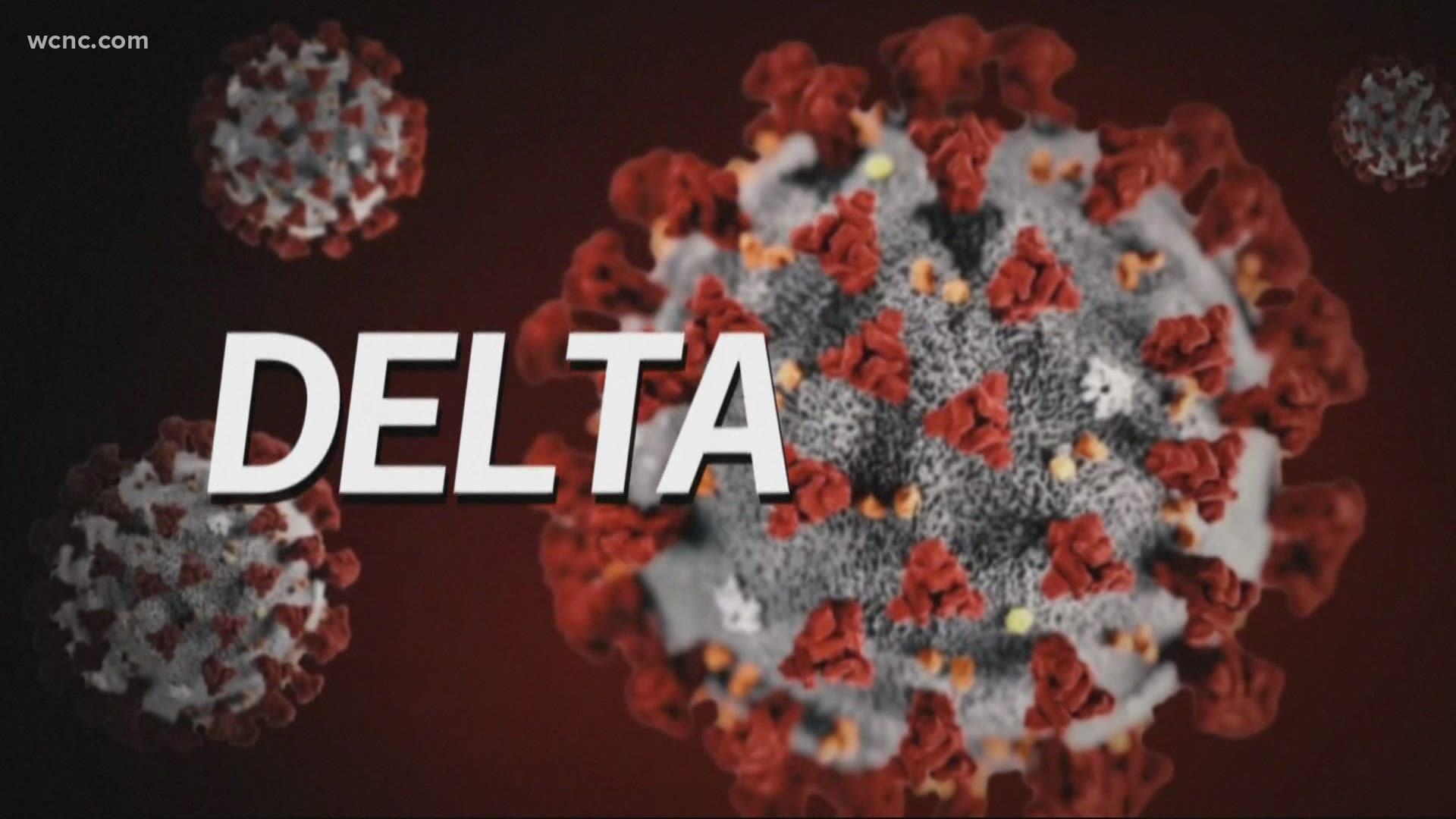CHARLOTTE, N.C. — The highly contagious delta COVID-19 variant is one of the fastest spreading variants, but could also prove to be one of more elusive to diagnose, doctors say.
That's because the delta symptoms do not follow the most common COVID-19 symptoms.
Dr. David Priest, an infectious disease specialist with Novant Health, said while the loss of taste and smell was the most telltale sign of the coronavirus throughout the pandemic, many getting sick with delta present with more vague symptoms, like a runny nose or sore throat.
Diagnosis is more difficult now with symptoms overlapping with another respiratory virus, Respiratory Syncytial Virus (RSV), which is spiking, and it could get even more complicated in the fall when cold and flu also join the mix more prevalently.


“This virus more efficiently binds to these cells, then enters those cells, and may, in some ways, elude immune system more effectively,” Priest said, noting that difference makes it more contagious and more likely to do damage in communities with lower vaccination rates.
Priest said with the overlap in symptoms across viruses, doctors will have to be diligent in pinpointing COVID-19 cases.
“Clinicians are going to have to think through that. They're going to have to have the testing. They need to distinguish these viruses and make sure it's not COVID because it's going to get confusing with a lot of things circulating in the community,” Priest said.
He noted that it is important for people to continue to get tested for COVID-19 if they have any of the symptoms, even if it feels like a mild cold.
Some misleading online claims state that data from the United Kingdom shows people who are fully vaccinated are more likely to die from the highly contagious delta variant than people who didn't get the vaccine. Dr. Jane Kelly, an assistant state epidemiologist with South Carolina's Department of Health and Environmental Control, said any conclusions from that data that say vaccinated people are more at risk of dying are built on flawed logic.
"It is quoting some numbers out of context and failing to understand that a certain number of people, inevitably, even if fully vaccinated, may contract COVID and have a bad outcome," Kelly said.
According to the CDC, the coronavirus has a wide range of symptoms:
- Fever or chills
- Cough
- Shortness of breath or difficulty breathing
- Fatigue
- Muscle or body aches
- Headache
- New loss of taste or smell
- Sore throat
- Congestion or runny nose
- Nausea or vomiting
- Diarrhea
Priest reminds: The longer people wait to get vaccinated, the more opportunity the virus has to mutate again. Areas with lower vaccination rates could see a rise in hospitalizations.
As delta continues to spread across the country, some health experts say it could be a threat to reopening plans. The latest Centers for Disease Control and Prevention estimates show, over the course of a month, the variant of concern grew from being 3% to 30% of new cases nationwide. There are confirmed cases of the delta variant in the Carolinas, and CDC estimates peg the virus's share of recent cases in North Carolina at about 12%.
Top officials with the World Health Organization warn the United States may be moving too quickly and lose control.
“Remember last summer, when we had everything got good and then, everyone kind of relaxed, and then we kind of arrived in September and October and ended up in huge trouble. I think that's where we are going again with a much more transmissible variant this time around,” Mike Ryan, director of the emergencies program for the World Health Organization, said.
“I think it’s these fires we're going to try and put out repeatedly as we go through the summer and into the fall,” Priest said. “And the hope is that people in those communities will get vaccinated. So, the fires will just be smoldering embers instead of wildfires, but that might be what we'll be dealing with for a number of months."
Experts say all three COVID-19 vaccines stand up against the delta variant. They are not 100%, meaning some breakthrough cases are possible. However, the chances of getting the virus are much lower in someone who is fully vaccinated than for someone with just one dose of the vaccine or someone unvaccinated.
The delta variant's arrival in the U.S. comes as demand for vaccines continues to decrease.
In Mecklenburg County, desire for the shot has gotten so low that mass vaccination sites are scaling back. The health department shut down its clinic at MEDIC headquarters, and Novant Health will only operate its east Charlotte clinic on Tuesdays and Thursdays.
However, there are still plenty of opportunities and places to get vaccinated quickly, as most pharmacies and some doctors' offices have the shots.
Contact Chloe Leshner at cleshner@wcnc.com and follow her on Facebook, Twitter and Instagram. Contact Vanessa Ruffes at vruffes@wcnc.com and follow her on Facebook, Twitter and Instagram.

